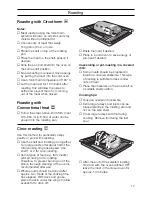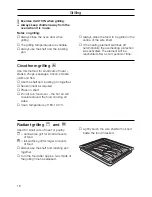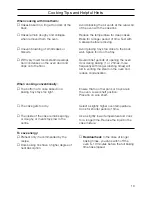
4
Important Information
Appliance safety
considerations
❑
The appliance should only be used for
the preparation of food.
❑
The surfaces of heating and cooking
appliances get hot during operation.
The interior oven walls and the heating
elements get extremely hot. Always
keep children away from the appliance.
❑
Never leave the appliance unattended
when cooking with fat or oil. They can
catch fire if overheated.
❑
Clean the oven regularly.
Fatty or oily remants could ignite when
the oven is switched on.
❑
Make sure that the power cord does not
get caught in the hot oven door. The
plastic insulation could melt.
❑
In the case of a defect, switch off (or
remove) the mains fuse in the building
electrical system.
❑
Do not store combustible items in the
oven. They could ignite if the oven is
switched on accidentally.
❑
Do not clean the oven with steam or
high-pressure cleaners.
❑
Grip only the centre of the oven door
handle when opening the oven floor.
❑
If using hot air
v
, do not place
greaseproof paper loosely in the oven
(e.g. when heating the oven).
The hot-air fan could draw in the paper
which may damage the heater and fan.
❑
Do not insert a baking sheet at the
bottom of the oven, or cover the base of
the oven with aluminium foil, as this
would result in heat build up. Roasting
and baking times would change, and
the enamel would be damaged.
❑
Never pour water directly into the hot
oven. Damage to the enamel could
result.
❑
Dripping juices may leave spots on the
oven lining. Always place a baking tray
below to prevent this from happening.
❑
Never stand or sit on the open oven
door.
❑
The oven door must close properly.
Keep the door seal surfaces clean.





































